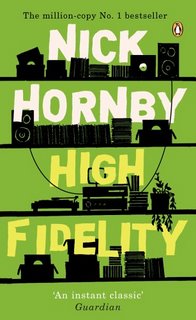The Phoenix Files
The comments and posts on The Phoenix Files do not necessarily represent the thoughts or feelings of The Phoenix and/or PhoenixvilleNews.com ownership or management. The Phoenix and PhoenixvilleNews.com also reserve the right to delete any post. Any post which contains obscene language will be removed. Any questions or comments on this policy can be e-mailed to lpettit@phoenixvillenews.com.
Wednesday, January 28, 2009
Tuesday, January 27, 2009
Monday, January 26, 2009
Class Issues in Popular Culture
In talking with our online editor the other day, we stumbled upon an idea that we think has some merit. It will take a moment to set up, so please bear with me.
We were talking about films, specifically those films that are, on the whole, pretty bad, but merit repeated viewing for that one inspired scene that lifts the whole film from the doldrums.
My best example: “High Fidelity.” This is not a great film (I know, the horror), but I continue to watch it when it’s on only for the series of scenes where Tim Robbins’ character confronts our protagonist in his record store and John Cusack’s character imagines ways he and his merry band of misfit co-workers (Doesn’t that sound hackneyed? I told you that film was bad.) could do physical harm to the aging hippie. That’s a great scene stuck in a bad film.
The discussion of that film brought us to how bad, in general, modern literature written by those of us under 40 is. Why is that? It’s not for lack of people that can write (and by that I mean people who can use the English language in ways that we should want to remember). The late David Foster Wallace could write (though on subjects that tended to be a tad outlandish, if not pretentious). Chuck Palahniuk can write. There are folks out there who have a talent for using the language and have ideas that speak to those of us not on our deathbeds.
Then, the conversation turned. Why does Palahniuk seem to speak to us more th an Hornby? There are a thousand answers to that, many of them having to do with the idea that Hornby writes cute, tidy little novels that make us all feel good about our station in life. One theory that intrigued me in the discussion, though, was that class, as an idea, may be past its time in a pop culture sense.
an Hornby? There are a thousand answers to that, many of them having to do with the idea that Hornby writes cute, tidy little novels that make us all feel good about our station in life. One theory that intrigued me in the discussion, though, was that class, as an idea, may be past its time in a pop culture sense.
British authors who won’t let this idea go, please listen up: I don’t care that Emma, the pauper’s daughter, wants to marry Little Lord Larry, but can’t because human class structure won’t hear of it (Oh, the tragedy!). It’s not just me. NOBODY CARES.
Within the structure of our popular culture, class has been obliterated. We, regardless of our income, watch the same shows and films, listen to the same music, go to the same clubs (in atmosphere, if not exactly the same ones), do the same drugs, etc.
The parts of ourselves given over to petty amusements (for some of us those parts are larger than others) have all come together in the same place now. This is not to say that there aren’t still serious poverty issues or class inequities, there are. But we’re in a unique age that has seen what is popular become within reach of literally anyone. This is why class issues, as the subject of popular entertainment, aren’t really viable anymore.
John Cusack doesn’t normally lend himself to discussions of this nature, but so be it. I’m interested in what you may think about this idea, so email me if you think I’m off base (or if you think it’s worth somebody’s time to read Hornby. Prove it to me, though).
Posted by
Nick Danna
We were talking about films, specifically those films that are, on the whole, pretty bad, but merit repeated viewing for that one inspired scene that lifts the whole film from the doldrums.
My best example: “High Fidelity.” This is not a great film (I know, the horror), but I continue to watch it when it’s on only for the series of scenes where Tim Robbins’ character confronts our protagonist in his record store and John Cusack’s character imagines ways he and his merry band of misfit co-workers (Doesn’t that sound hackneyed? I told you that film was bad.) could do physical harm to the aging hippie. That’s a great scene stuck in a bad film.
The discussion of that film brought us to how bad, in general, modern literature written by those of us under 40 is. Why is that? It’s not for lack of people that can write (and by that I mean people who can use the English language in ways that we should want to remember). The late David Foster Wallace could write (though on subjects that tended to be a tad outlandish, if not pretentious). Chuck Palahniuk can write. There are folks out there who have a talent for using the language and have ideas that speak to those of us not on our deathbeds.
Then, the conversation turned. Why does Palahniuk seem to speak to us more th
 an Hornby? There are a thousand answers to that, many of them having to do with the idea that Hornby writes cute, tidy little novels that make us all feel good about our station in life. One theory that intrigued me in the discussion, though, was that class, as an idea, may be past its time in a pop culture sense.
an Hornby? There are a thousand answers to that, many of them having to do with the idea that Hornby writes cute, tidy little novels that make us all feel good about our station in life. One theory that intrigued me in the discussion, though, was that class, as an idea, may be past its time in a pop culture sense.British authors who won’t let this idea go, please listen up: I don’t care that Emma, the pauper’s daughter, wants to marry Little Lord Larry, but can’t because human class structure won’t hear of it (Oh, the tragedy!). It’s not just me. NOBODY CARES.
Within the structure of our popular culture, class has been obliterated. We, regardless of our income, watch the same shows and films, listen to the same music, go to the same clubs (in atmosphere, if not exactly the same ones), do the same drugs, etc.
The parts of ourselves given over to petty amusements (for some of us those parts are larger than others) have all come together in the same place now. This is not to say that there aren’t still serious poverty issues or class inequities, there are. But we’re in a unique age that has seen what is popular become within reach of literally anyone. This is why class issues, as the subject of popular entertainment, aren’t really viable anymore.
John Cusack doesn’t normally lend himself to discussions of this nature, but so be it. I’m interested in what you may think about this idea, so email me if you think I’m off base (or if you think it’s worth somebody’s time to read Hornby. Prove it to me, though).
Posted by
Nick Danna
Tuesday, January 20, 2009
Friday, January 16, 2009
Wednesday, January 14, 2009
Tuesday, January 13, 2009
Friday, January 9, 2009
LOCAL DOCUMENTS: On fear
We’ve talked a good deal around town about fear, especially about fears of economic uncertainty.
The short historical walk into February and March, 1933, of Monday’s column IN COMMON sought out the genesis of Roosevelt’s iconic line about the only thing we have to. In so doing I slyly avoided answering the question with which it began: what’s the line really mean?
But that work was already done here, in this place. In a remarkable sermon delivered on November 30 at St. John’s Evangelical Lutheran Church, Pastor Cynthia Krommes got to the heart of it.
Now, to bring together the thirteenth chapter of the Gospel of Mark with the tag li ne from The Hitchhiker’s Guide to the Galaxy could have been counted feat enough. It may even have been enough to identify and name threads of hope buried within the stark images of destruction and desolation in the biblical text alone.
ne from The Hitchhiker’s Guide to the Galaxy could have been counted feat enough. It may even have been enough to identify and name threads of hope buried within the stark images of destruction and desolation in the biblical text alone.
But those very feats were accomplished by an argument which was as much neurological as theological:
“’DON’T PANIC!’ Because when we panic we do not use our whole brain, but only the base of it. That part keeps us alive when we’re under attack for it controls the fight or flight mechanism. But it doesn’t give us options. When we use our whole brain…we [are enabled] to move beyond panic into other possibilities and in doing so to go from being reactive to proactive. Options open up and a new future is born.”
Those apocalyptic images in Mark’s gospel? They’re in place not to engender fear but to target frontal lobes badly in need of a good thaw and some good exercise. Signs of hope? Images of life in death, and of the stunningly, bafflingly unexpected emerging from the narrow confines of blinkered common prediction.
“So, DON’T PANIC, but instead hope. Then all sorts of possibilities open up.”
And to the point with which we began: “What might take place in our community when instead of succumbing to economic fear and paralysis, we make a commitment that we will get through this together?”
Posted by
G.E. “Skip” Lawrence
The short historical walk into February and March, 1933, of Monday’s column IN COMMON sought out the genesis of Roosevelt’s iconic line about the only thing we have to. In so doing I slyly avoided answering the question with which it began: what’s the line really mean?
But that work was already done here, in this place. In a remarkable sermon delivered on November 30 at St. John’s Evangelical Lutheran Church, Pastor Cynthia Krommes got to the heart of it.
Now, to bring together the thirteenth chapter of the Gospel of Mark with the tag li
 ne from The Hitchhiker’s Guide to the Galaxy could have been counted feat enough. It may even have been enough to identify and name threads of hope buried within the stark images of destruction and desolation in the biblical text alone.
ne from The Hitchhiker’s Guide to the Galaxy could have been counted feat enough. It may even have been enough to identify and name threads of hope buried within the stark images of destruction and desolation in the biblical text alone.But those very feats were accomplished by an argument which was as much neurological as theological:
“’DON’T PANIC!’ Because when we panic we do not use our whole brain, but only the base of it. That part keeps us alive when we’re under attack for it controls the fight or flight mechanism. But it doesn’t give us options. When we use our whole brain…we [are enabled] to move beyond panic into other possibilities and in doing so to go from being reactive to proactive. Options open up and a new future is born.”
Those apocalyptic images in Mark’s gospel? They’re in place not to engender fear but to target frontal lobes badly in need of a good thaw and some good exercise. Signs of hope? Images of life in death, and of the stunningly, bafflingly unexpected emerging from the narrow confines of blinkered common prediction.
“So, DON’T PANIC, but instead hope. Then all sorts of possibilities open up.”
And to the point with which we began: “What might take place in our community when instead of succumbing to economic fear and paralysis, we make a commitment that we will get through this together?”
Posted by
G.E. “Skip” Lawrence
 RSS Feeds
RSS Feeds



